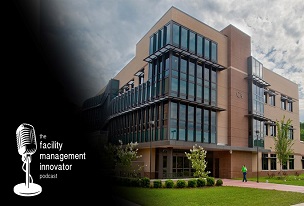[PODCAST TRANSCRIPT] Episode 5: Interview with Steve Patterson | Director of Facilities at NVCC

On this episode, Mike Petrusky talks with Steve Patterson, Director of Facilities at Northern Virginia Community College, about collaborating with FM colleagues and industry partners while building a human network at professional associations. Steve shares his views on industry trends, leveraging technology, and developing FM training programs to face the future. Mike gets excited about making this Hokie connection and talks more about his time in Blacksburg.
PUBLISHED: OCTOBER 3, 2016
Show Transcript:
Steve: How do I attack that problem? How do we solve that problem? Can I use the internet of things to solve a problem? Can I use technology? Being at conferences and talking to experienced people really helps me.
This is "The Facility Management Innovator Podcast" where we talk with FM industry leaders about workplace trends, challenges, and the future of the built environment. This show is brought to you by Kayrell Connections, providing information, consulting and marketing expertise to help organizations deliver workplace innovation to the facility management community.
Mike: Hey there! How's it going, my fellow FM innovators? this is Mike Petrusky, and I am super excited to welcome you to Episode 5 of The Facility Management Innovator Podcast. This show is coming at you the first week of October and many of you might be on the way, or already in, San Diego for the big IFMA conference this week. And if you are, I hope you have listened to our special episode about IFMA's World Workplace, And if not, please stop the playback right now and go over to Episode 4 of the podcast, get yourself ready for World Workplace, and don't forget to connect with Mayra and me while in San Diego this week. And once you are all caught up, and ready to rock and roll, please do come back and pick things up here with Episode 5. Now, I hope you are enjoying our little podcast so far. We are certainly trying our best to keep things interesting, and to that end, we have a bit of a different twist today. Our first few interviews you may have noticed where FM innovators who engage the facility management community from their industry partner roles, bringing solutions to facility managers, but now we get our first chance to hear from the facility management practitioner point of view, with our guest today, the Director of Facilities at Northern Virginia Community College, Steve Patterson.
So, are you ready to hear some candid insights from the property owner perspective? Steve's going to share his views about facility management, and how he is leveraging relationships with both FM colleagues, and with industry partners, to meet the daily challenges he faces. But, before we roll the tape...is that even a thing anymore? "Rolling tape"? I really doubt it. Before we get started, I do want to mention something very exciting that I discovered about Steve that did not make it into this recorded interview. I am shocked. I am dismayed. How did we not talk about this at the time?? But I found this out when I first met Steve, about a year ago in fact. It was exactly a year ago, at World Workplace 2015 in Denver. We spent some quality time hanging out there. As Mayra and I said, people often do. And we got to know each other, and it was back then that I first discovered that Steve has his MBA... from Virginia Tech! That's right, Go Hokies!! Can we play "Tech Triumph" or a little "Hokie Hokie High"? No? Can't get the licensing for that? No? All right, moving on... But that was really awesome news to me because, as many of you who already know me are well aware, I am a passionate Hokie! My wife and I met in Blacksburg, my two daughters are from Virginia Tech, one is a student there, one graduated. I'm so proud of both of them! But yeah, I am sure we will talk about my love for the Hokies now that football season is underway. And you may have heard me mention back a few episodes ago about my radio dream back in college. You know, I was a student at Virginia Tech by day, but at night, I was actually on the radio. That's right, for a time, I was known as "The Red Rocker". That's right, let that sink in. So, a lot of good times, a lot of good memories from my time in Blacksburg. I'm sure I'll share some more stories down the road about that, but why did we get off track? Oh! Steve got his MBA from Tech... So listen, Steve's a great guy... I did later find out, though, that Steve's wife and son are from the University of Virginia, they are Wahoos! And his daughter is a graduate of James Madison University... both fine institutions here in the beautiful commonwealth of Virginia mind you... But they are two of our biggest in-state rivals! And Steve and I exchange some friendly banter back and forth about this. Seriously, though, it's all been good fun and it's been great getting to know Steve over this past year. I'm now serving with him, side by side, on the board at the Capitol Chapter of IFMA, and now it's your chance to get to know him a little bit, too. So here we go, let's "roll the tape"...
Mike: Welcome, Steve Patterson.
Steve: Thanks, Mike. Glad to be here.
Mike: Steve's the Director of Facilities at Northern Virginia Community College. He has 30 years of experience in all phases of building improvement and energy services in the public and private sectors. His expertise includes project management, energy engineering, capital project planning, contract negotiation, and the list goes on and on. Man, what don't you do?
Steve: Thanks.
Mike: We know there's a lot more about Steve than just all these great credentials and experiences, so please tell us a little bit more about yourself personally. Who is Steve Patterson beyond being an "FM professional extraordinaire"?
Steve: Well, that covers a lot of the ground. I like to golf, and our daughter is just out of college, and our son is still in college, so we'll go visit him quite a bit. And my wife has been working at Verizon for about the same 30-year period as myself, here.
Mike: So talk to me more about what you consider to be your expertise, and I know that I rattled off a lot of different areas of experience you have, but if I put you on the spot and said, "what are you most expert about", what would you say?
Steve: Really, I just spent a lot of time with construction management, project managing myself, and then having teams of project managers. Secondly, energy efficiency. I spent years developing energy projects, building energy projects, energy engineering, things along those lines. Now, I'm learning more and more about facilities management from the owners perspective. You know going from a utility background to a contractor background, the last several years I have always thought about getting on the owner side, and I've really been excited to be here at Northern Virginia Community College the past year-and-a-half, being on the owner side of the ledger.
Mike: NOVA is the largest public educational institution in Virginia, and the second largest community college in the United States, comprised of more than 75,000 students, 2,600 faculty and staff members. To manage a facility institution of the size you must wear a lot of hats each day. I mean, what parts of your job are you most passionate about?
Steve: You know, the thrilling part of being in an owner organization is it's your sandbox. It's your buildings, your campuses, we happen to have about 50 buildings across the six campuses in Northern Virginia. We are in three different counties, plus the city of Alexandria, and every day is a new challenge. That's what I liked about project management was every day was different. In facility management, every day is different, and I just love the aspects of it. It might be an engineering issue, it might be a financial issue, a budget issue... We're working with human beings, we have internal customers, and pleasing internal customers can be harder than pleasing external customers. So, it's an absolutely fascinating variety pack from that perspective.
Mike: So we talked a little bit about IFMA, and our role here locally, but talk a bit more about that association, other professional organizations you've been a part of during your career, and how that has helped you advance in your career?
Steve: I've always had a strong belief that the two main things we have going for us is our resume, and our network - our human network. And I spent 20 years with the Association of Energy Engineers. I was on the board of the local chapter here in DC and we won some of the national awards with our local chapter. I'm very proud of that, but the upshot of it, one of the upshots or one of the great things about it was you are building those professional relationships, you're building your network, you're learning, you are continuing to develop yourself professionally as you go, and at IFMA, I found it to be a great home now that I've switched over to the owner side here a year and a half ago. So, the growth always continues with the networking. The kinds of relationships I've been able to cultivate since I've joined IFMA had been a bit different from when I was with Association of Energy Engineers, both fantastic organizations, and IFMA is very congruent with what my job responsibilities are now, which include a lot of non-engineering types of things. And recently, I called the Director of Facilities for the San Diego Unified School District, a person I've never met in person, who lives thousands of miles away from me here in Virginia, and we were talking about turf fields, and lots of issues and research studies. There's an ESPN report talking about "are they safe?". And that sort of thing, and I got all kinds of information... and then eight weeks after that phone call, I'm sitting in the office of our president, talking about turf soccer fields, and I had an awful lot of information I was able to provide in a pretty short briefing. It was really through the leveraging of the network. Now, I had to know that that issue is going to come up later, but it worked out perfectly where I was able to leverage the person's knowledge to help me look smarter and better at my job.
Mike: That's what we see at IFMA. I mean, we see so many opportunities to collaborate, not just among professional members but with industry partners who have all of this knowledge, the latest technologies, latest resources, and I am always saying to them, "we need to be a person of value, deliver this information to our FM professionals". So, when they have that opportunity to present to the C-suite, or to engage in some type of an innovative solution, and whether it's on a campus, or in the private sector, and there's a problem that needs to be solved, then you need to be top of mind, and you say, "Hey, I've heard about that, I know how to get that done, let me tap into my industry partners and help deliver that solution to my organization", right?
Steve: That's right, Mike. Time is the most precious thing, it's the scarcest resource. My own time and my team's time, and it's just impossible for me to entertain all of the vendors, contractors, and consultants that might like to come over and visit with me. But, if I can become aware of them at an association event, or at an IFMA event, or an IFMA conference, then when I do have that challenge for that problem, then it will be on my mind, you said top of mind, that I can reach out and connect with them then, because you know when the problem hits my desk, then we are gonna look for solution, and that's where we're hunting for how do we get there procurement wise, and how do we get there from a technical solution provider point of view.
Mike: So, how do you personally like to investigate or research what's going on in the industry? I mean, are you listening to podcasts for example, or do you read publications, professional journals, or just online web search? If you're looking for some information, how do you find it, and how do you kind of determine, hey, that company or that person knows what they're talking about?
Steve: I tend to put most of my energy into industry trends, best practices, my network of peers. I'll call at all weird times of the day and night, they'll call me with problems, but while I'm respond to their questions, they're responding to my question of the moment, we will also quickly jump to...Hey, what's going on? What's the next big thing that's going to help us? What's the next big thing that's going to create a lot of problems? One example is the legislation around storm water and MS4. That came about a couple years ago and that was a huge change. It resulted in people like me having to hire environmental people, having to hire consultants so we could start doing all the compliance requirements to do it properly, and it may not have been an area of expertise pre-existingly with directors of facilities. That would vary, but for me, it's staying plugged into the industry, finding out what my peers are doing and talking about, and then at conferences I'll bring a huge list of questions and a suitcase full of problems with me, and I'll try to draw a bead on the solutions from talking to people that I see the conference, "buttonholing" speakers. I'm trying to extract a lot of value. If I spend the state's money to go to a conference, and I've been that way before I came to the state, and then that helps me. In my mind, I'm thinking about problems. How do I attack that problem? How do we solve that problem? Can I use the internet of things to solve a problem? Can I use technology? How to approach that problem? And being at conferences and talking to experienced people really helps me develop that strategy, and after that, you know, it's deploying the details to sort it out.
Mike: That's great stuff. And I also know that you have the ambition to potentially speak at some of these conferences, right? I mean, it's a tough gig to get. Buy when you get it, you'll have a lot of knowledge experience to share. What would you like to talk about, if you did have the opportunity?
Steve: I think there's, you know, depending on what the theme of the conference might be, but I'm interested in developing and deploying a training program for our own department. I've talked to a lot of people about how to organize such an effort. It's a huge effort, and it cuts across different areas, but I know that some of my peers use community colleges to obtain training for themselves. So, I think we also have the opportunity to be the source of training, not just the purchaser of training from an outside entity. I think of trends in facilities management, and really the problems that I'm trying to solve, and part of it is to have some successes that we can then talk about. I don't really want to speak about something that I want to solve, that I can't explain to my constituents, but that I've solved and I have success to share. So, a little bit of it is waiting for the good story that we can then share with others.
Mike: Let's talk a little bit about the industry, and I know you've got a lot of different background experience, but where do you think FM has been over the last five to ten years? What’s changed the most? Then, I'm gonna ask you what do you think the future of facility management looks like?
Steve: I think if you go to any major conference about facilities management or facilities maintenance, the issue that's confronting everybody is an aging workforce, technology is changing, there's a lot of budget pressure, there's also a loss of institutional knowledge, folks retire, so I think everyone is aware of those factors, and none of those are particularly easy problems to solve. I think that's where the industry's been, it is just the nature of the beast.
Mike: And where are we going?
Steve: In the future, I think it's going to continue to be, if we have an aging workforce, and technology's changing, and the demands for maintenance is getting, is increasing over time, it's going to push us towards trying to figure out a great way to get training programs for our staffs. Secondly, it's gonna push us more and more towards technology. We know the Internet of Things isn't going away, we know that we have control systems, we know that we have a lot of disparate systems that are just dying to share their information with us as facility managers, and that gets us to: How do we integrate our systems? How can we leverage one of the mega trends of convergence where we're going to try to bring all that data together? We aspire to build integrated work management systems. It's expensive, it's complicated, we have to make sure that it doesn't choke us out while trying to implement it. We have to make sure that it doesn't solve two problems while creating five other problems simultaneously. So it's not easy! It's not easy at all. It's a big challenge, and I think the facility manager of tomorrow is going to understand the engineering and the operations in the financial and the procurement, we can never forget about procurement, particularly for those of us in the public sector to bring that together. It's going to require vision. We're going to need to get a lot of help from industry. We need help. I tell folks every day, when I meet with contractors and consultants, that we need a lot of help. I have the same challenges that the industry has, which is how can we get together? We have to follow all the requirements, we know that much, but we need a lot of help, and we need smart people to help us get to where we're trying to get to, and how do we do all this within our budgets that we, you know we're all confronted with a budget. So it has to be within our budget, and one of the mantras I say and the office is "we just want to do things to help ourselves", we need a lot of help and we want to be better, faster, and smarter. How can we leverage technology and tools to do that?
Mike: Well, that's excellent. The industry partners out there, not the "old-school" vendors that are trying to knock on your door, and throw brochures at you, but the true "partners", who are willing to get their hands dirty with you, and invest their time, and bring their expertise to the table and really help be a partner in solving these problems, you mentioned, are the ones that are really going to thrive in the future. That's what we're trying to do here, through this podcast, and through the work I do at Kayrell Connections, is really to equip our industry partners to better serve facility professionals like yourself, so I appreciate you commenting on that.
Steve: I think the name of the game for facility managers and practitioners is really being resourceful. You know, "the smarter we are" really means "the more resourceful we are". We know this from project management, that thinking in terms of options, being resourceful, and one of the things that I think really applies well is not "if", just "how". You know we're not really thinking in terms of are we gonna fail, are we going to succeed, it’s just how are we going to succeed, and I think that's really critical.
Mike: Well, thank you, Steve. Our time is up. I appreciate you spending this time with me. You can now make your tea time in a little while here, but it's always great to hear the FM professional's perspective on the industry, the value of strong partnerships, and the opportunities for collaboration through IFMA, and other professional organizations. I really do appreciate that.
Steve: Thank you, Mike.
Mike: All right, there you have it. Good times, and "Go Hokies" with Steve Patterson. So much quality content from Steve. I hope you got a lot out of it. So, please, if you have any thoughts about something Steve shared, or if you've just got some comments about these first handful of podcast episodes, why not let us know? In fact, the best way to support the show is to head over to iTunes and give us a rating. There's some stars there on the iTunes homepage for the podcast, just click those stars, it'll say "thanks"! Consider that us saying, "thank you for the support". And if you really want to help, please write a review, just a brief one, and tell us how we're doing. If you are kind enough to do that, I will happily give you a personal "thank you", and a shout out on a future episode. How's that for an offer you can't refuse? More movie quotes! Thank you so much to those of you who have already emailed me about the podcast in these first couple of weeks. I can't begin to tell you how encouraging it is to hear that you are listening and enjoying some of what we are putting out there. And we'll continue to do it! I can't wait to talk to you again soon, and until then, of course... Be an FM innovator!® Peace out!
You’ve been listening to “The Facility Management Innovator Podcast”. We hope you found this discussion beneficial, as we work together to elevate the FM community, by building partnerships that lead to innovative, workplace solutions. For more information about facility management collaboration and marketing resources, visit www.kayrellconnections.com.
LISTEN TO THE EPISODE: http://kayrellconnections.com/episode5
SUBSCRIBE ON ITUNES: https://itunes.apple.com/us/podcast/facility-management-innovator/id1154571864






Comments